PHOTO
LONDON - Frantic stockpiling has given unfashionable food brands a new lease of life. Widespread lockdowns sent consumers rushing to hoard humdrum products like PG Tips tea or frozen Hot Pockets. The shift is forcing chief executives of consumer giants such as Unilever, and Nestlé to rethink their priorities.
Empty supermarket shelves in Britain and elsewhere during parts of the lockdown testify to the enduring popularity of cupboard and freezer foods. According to market researcher Nielsen, sales of long-life groceries jumped compared with 2019 after years of sluggish growth. That’s a sharp contrast with the pre-pandemic world, when customers favoured healthier and less-processed foods.
The shift could prompt a value reassessment. Unilever may find there are more eager buyers for its tea business, which has revenue of around 3 billion euros from brands including Lipton and PG Tips, once its bankers can organise competitive auctions again.
Investors may also prompt a rethink about what gets put on the block. Unilever CEO Alan Jope has pledged to sell brands that don’t “stand for something”. But in a world scarred by memories of lockdowns, filling the freezers and larders of anxious consumers could itself be considered “purposeful”.
Unilever has in recent years filled its shopping bags with upmarket skincare brands and expensive detergent. While these are arguably affordable luxuries, they are hardly essential, and growth will suffer if consumers tighten their belts. By contrast, trusty old Knorr stock cubes, previously considered a candidate for disposal, could prove a counterweight against the economic cycle.
Nestlé boss Mark Schneider, meanwhile, had already shoehorned dog food into his strategy of focusing on “nutrition, health and wellness”. So, it shouldn’t be too hard to declare frozen ready meals and snacks like Hot Pockets as similarly strategic, even though the Americas unit only reported low single-digit revenue growth last year.
In a world where supplies of fresh food are less certain, dowdy cupboard and freezer fillers may still have a place. For consumer giants contending with a potential slowdown unseen since the Great Depression, rejigging their brand portfolios is not going to be their first concern. But when things calm down, chief executives will reassess what should stay and what should go.
CONTEXT NEWS
- Unilever Chief Executive Alan Jope said in January the consumer goods giant was continuing to review its portfolio and had initiated a strategic review of its tea business, which includes brands such as Lipton and PG Tips.
- Nestlé has announced disposals with a total value of around $15 billion since activist investor Dan Loeb launched his campaign to shake up the company in 2018.
(Editing by Peter Thal Larsen and Karen Kwok)
© Reuters News 2020




















